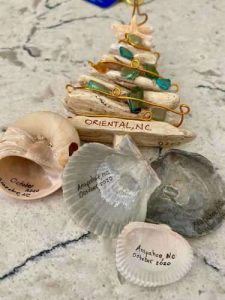Sarah’s Simple Pleasures: Traditions
By Sarah McCoy | October 29, 2020 |
 We are entering the season of traditions in a time when nothing is traditional.
We are entering the season of traditions in a time when nothing is traditional.
It feels especially strange when the rest of creation appears to be operating routinely. The sun and moon continue to orbit like clockwork: the days growing shorter, the nights longer. The trees are all turning shades of amber and scarlet. The woodland critters collect their winter provisions as temperatures dip, dip, dip on the same scientific bell curve followed since the dawn of time.
The natural world is paying no mind to the fact that kids aren’t back in their conventional school desks, families aren’t sitting round their tables, football stadiums aren’t roaring with fanfare, and the traditional social calendar has been completely thrown out.
A devotee of musicals, I can’t help but hear Tevye from Fiddler on the Roof raising fists to the sky, “Tradition, tradition!”
But, really, what are traditions? The dictionary says that they are customs or beliefs passed on from one person to the next, from one time to the next. A tradition can last for a season: We get Big Dipper cones from the ice cream truck in the summers. Or for generations: My family goes to church every Christmas Eve. But the fuzzy edges of traditions remind us that they had a starting point, which means they will, eventually, have an ending. Maybe not permanently—that’s another nebulous area. A tradition can stop and then pick up again at another juncture in history. Breaks don’t mean termination. They simply illustrate that we are human and so, nothing about us is certain. Everything living— from our bodies to our communities— is in a constant state of reinvention. It’s what defines us from the rest of the universe. It’s what makes us unique.
So then, why are we surprised when our self-imposed conventional algorithms disappoint?
It’s made me 1) think about how I define a tradition, and 2) evaluate if the traditions I maintain are helping or hindering my access to peace, joy, and love.
Because sometimes a tradition becomes a burden. It mutates from being a thing we long to do to a thing we feel we must do out of obligation. Cherished tradition and ritualistic superstition can mesh so that we can’t tell one from the other. Recognizing the difference is the linchpin.
For example, this past summer, my sweet nephew and his betrothed were wed across the country. Tradition told us: “It’s a family wedding. You must attend.” But we did not. Despite knowing that this was the responsible decision during our COVID times, there remained a lingering guilt. Not imposed by any person or persons, but by the oppressive other of the tradition—the social stigma attached to going against the cultural precept.
I use this as an example only because a wedding is an event that transcends generations, race, religions, countries, politics, etc. It’s one of our oldest human traditions, would you agree? Families gather in unifying celebration to welcome a new member into the collective circle. But what happens when there’s a viral pandemic and group gatherings will possibly result in illness and death? Well, tradition must be broken. It breaks our hearts, too, but in the breaking we are able to live and grow in a new direction. Traditions have the power to give beginnings and endings. It’s our choice.
 Earlier this month, I met up with my parents in a remote North Carolina beach town to reunite after eleven months of quarantine separation. We’d never been apart this long in all my life. We’d never visited this location before either. Never done a trip like this at all. We met between homes where it was safe and away from everyone but our four. It turned out to be one of the most deeply restorative vacations we’ve had. We weren’t sidetracked by a litany of planned activities, family members piled on top of each, crowds, commotion… Don’t get me wrong, those things have their moments of appreciation. But here we were doing something entirely untraditional and without any expectation of making it a tradition. We were simply being together.
Earlier this month, I met up with my parents in a remote North Carolina beach town to reunite after eleven months of quarantine separation. We’d never been apart this long in all my life. We’d never visited this location before either. Never done a trip like this at all. We met between homes where it was safe and away from everyone but our four. It turned out to be one of the most deeply restorative vacations we’ve had. We weren’t sidetracked by a litany of planned activities, family members piled on top of each, crowds, commotion… Don’t get me wrong, those things have their moments of appreciation. But here we were doing something entirely untraditional and without any expectation of making it a tradition. We were simply being together.
So, when my mom turned to me in a beachside trinket shop with two matching sea glass Christmas tree ornaments, I had to smile. During our annual Christmas gatherings, my family members pick up matching ornaments. A black and gold ceramic bauble from Ellis Island in New York City. A clay moose family from skiing in Vail, Colorado. Virginia state cookie cutters strung with ribbons. White House historical ornaments going back to the 1990s. Disney World mouse ears from 2019.
It wasn’t our tradition to get ornaments in October from a shop that sold fish bait. But that’s the thing about traditions, they are what we make of them, not what they make of us. When I hang this beach ornament on my tree in the weeks ahead, my heart will be full knowing that my mom and dad are putting the same on theirs. Our traditions will come and go, bend, break, be lost, replaced, and even necessarily discarded. That doesn’t make them good or bad. Doesn’t make us good or bad. The memories are the significance, and those simple pleasures we take with us come what may.
What old tradition are you breaking in 2020 or what new ones are you starting?
[coffee]









Our only son, our youngest child, was married in his newly planted garden in his new home. He and his love had been living there for over a year. Traditions bend to necessity. We are a living family. His sisters could not attend because of numbers and distance. But all of us are healthy. Adaptation keeps folks alive. Tradition shines in a new light.
Dear Beth,
I love what you wrote: “Adaptation keeps folks alive.” Absolutely. And it’s in the adapting that we make new memories– brighter ones– that become the “tradition” of today. Thank you for sharing your experience with your son’s marriage and for adding to the discussion. It’s so encouraging!
Yours truly,
Sarah
http://www.sarahmccoy.com
This is beautiful, Sarah, and reminds me of why we create traditions in the first place: to celebrate our being, to gather with loved ones, to share moments and memories.
While 2020 will undoubtedly look different, these traditions can still exist in small but important ways.
Thanks for the reminder.
Hugs
Dee
Dear Dee,
Thank you for being part of “the celebration of being,” my friend!
I pray your COVID-safe, new traditions Halloween was wonderful.
Yours truly,
Sarah
http://www.sarahmccoy.com
And what is the role of tradition in the story you’re working on? Do traditions guide character choices or frustrate them? Create tensions between characters or within them? Lead them to new understanding or???
Dear Leslie,
This is a wonderful prompt. You could lead a Creative Writing workshop for an entire semester on the questions you’ve posed. Wonderful food for thought!
My answer is yes, absolutely, entirely, all of the above. 🙌
Thank you for being part of the discussion and cheers to new traditions and new stories and new story traditions!
Yours truly,
Sarah
http://www.sarahmccoy.com
Thank you Sarah for your post and I’m glad you enjoyed your visit to my hometown. I live and write in Oriental and both my novels are set there. It’s a special place and the perfect location to connect to yourself, family and nature. Your post reinforces that one of the gifts of the pandemic is becoming more flexible. What is the core value beneath our traditions, and how can we express this value in new circumstances, are questions we’re all asking ourselves as the season of traditions approaches.
Dear Heather,
Oriental, NC, was bucolic! It reminded us of charming fishing towns in the UK.
We happened to meet the current owner of the gorgeous Will Moore House on the harbor. He gave us the most fascinating history of both the house and the town. Clearly, your town is full of generously welcoming people. Despite the pandemic, your town’s hospitality is living proof that core values are what create legacy. Not necessarily set traditions.
So thank YOU for being part of that and the greater Writer Unboxed village. Happy season of light!
Yours truly,
Sarah
I admit I’ve turned in to a bit of a non-tradition person. There are things I likely do from year to year on special occasions and all, but I tend not to think about them much any more. When my son was young I did traditional things, mostly at Christmas, but many years later, once I lived alone, I enjoy seeing others’ traditions but don’t tie myself to them!
However, one thing I am missing because of the pandemic is traveling to Oregon to visit my son and family. My DIL is seeped in family tradition. My son has his traditions for my grand-daughter – and I love being a part of it, especially at Christmas.
Thank you for the lovely post.
Dear Kathryn,
I’m praying you get the opportunity to visit Oregon–not for tradition’s sake but for present experience! “Being” in the moment of the memory is the legacy you give your daughter, son and daughter-in-law. Whether that’s in person or via Zoom or some other media, your active participation is what matters and it sounds like you are committed to just that. They are lucky to have such a blessing of a mom/grandmom as you. We here in the Writer Unboxed community feel the same. Thanks for being part, Kathryn, and hurray for the season of light’s commencement!
Yours truly,
Sarah
http://www.sarahmccoy.com